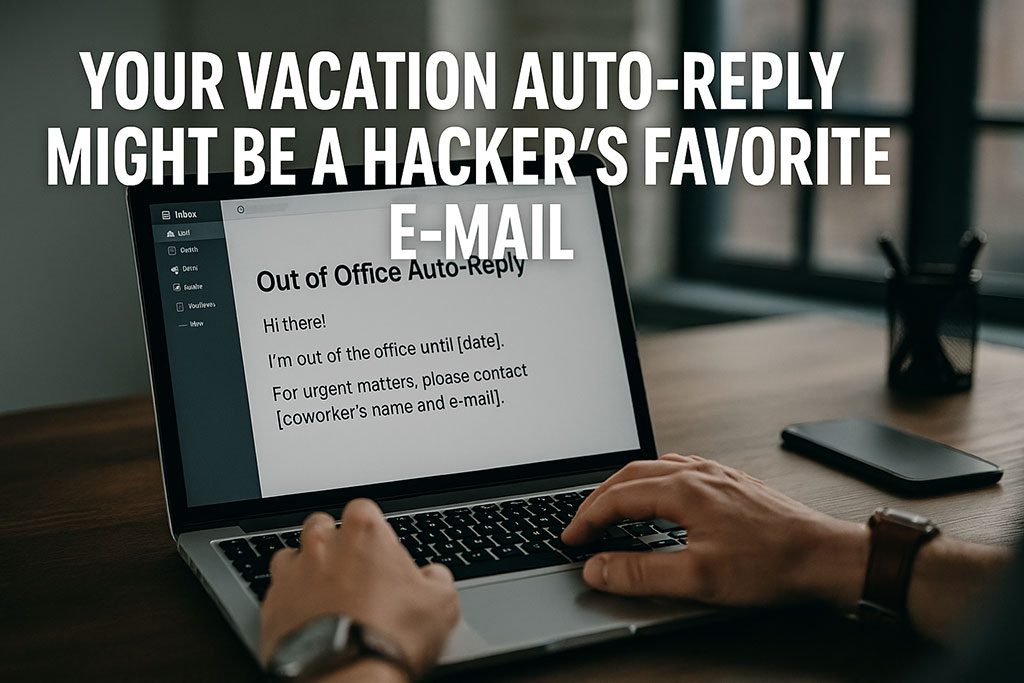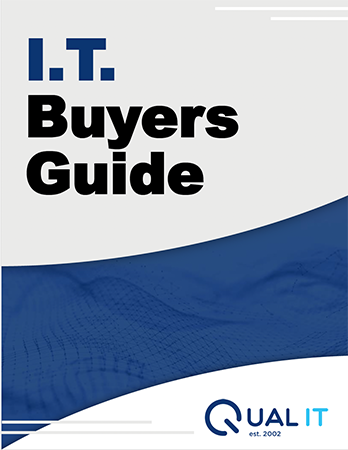
You’re gearing up for your fly-fishing trip in the Uintas or finally cashing in on that well-deserved weekend in Moab. While you’re mentally checking out, your e-mail inbox might be inviting cybercriminals in.
You know the drill:
"Thanks for your message. I’m out of the office until [date]. For immediate assistance, please contact [colleague’s name and e-mail]."
It seems professional—efficient even. But if you’re a financial advisor in Salt Lake City, this kind of message is also a neon sign for hackers looking for an easy mark.
What Makes These Auto-Replies So Dangerous?
Let’s break it down. A standard OOO (Out-of-Office) reply usually includes:
- Your name and role ("Senior Advisor, Compliance Lead")
- Dates you’re unavailable
- Alternate contact names and direct emails
- Internal reporting structure
- Travel details ("I’m at the NAIFA Conference in San Diego")
For a hacker, that’s gold. Why? Because now they know:
- Timing is on their side
You're not monitoring activity. That’s a prime opportunity to sneak in unnoticed.
- Targeting just got easier
They can now impersonate you or your assistant to trigger a wire transfer or snag sensitive client data.
This is how Business Email Compromise (BEC) attacks often start—and they’re particularly devastating in the financial services industry where trust is everything.
The Most Common Scenario We See with Financial Firms
Step 1: An advisor sets an OOO reply before heading to Park City for the long weekend.
Step 2: A hacker scrapes that message and spoofs the advisor’s e-mail.
Step 3: They contact the admin or associate listed in the auto-reply, requesting an “urgent” transfer to a custodial account or asking for a client’s sensitive documents.
Step 4: The assistant, used to these types of requests, complies.
Step 5: You return Monday to discover $50,000 just vanished—or worse, a client’s trust did.
This happens. Frequently. And in Salt Lake’s tight-knit financial advisory community, word gets around. Your reputation—and compliance record—can take a major hit.
Salt Lake Advisors: How to Lock Down Your Digital Perimeter
We’re not saying ditch OOO replies altogether. But if you’re running a fiduciary practice, wealth management firm, or solo RIA, there are smarter ways to protect yourself.
- Make It Generic
Remove specifics about your travel plans, personal cell numbers, or alternate contacts unless absolutely necessary.
"I’m currently out of the office. For assistance, please call our main line at (801) XXX-XXXX."
This removes direct targets and limits exposure.
- Educate Your Team (Especially the Admins)
Train your staff—especially anyone who handles wires, custodial communication, or compliance documentation—to:
- Never act on a financial or sensitive request via e-mail alone
- Always verify through a second channel (like a phone call)
- Flag any unusual language or sense of urgency as a red flag
- Invest in Advanced Email Security Tools
Salt Lake’s financial firms are increasingly being targeted by spoofing and phishing attacks. Ensure your IT partner has set up:
- SPF, DKIM, and DMARC authentication protocols
- Real-time phishing detection
- Domain monitoring to catch lookalike domains
- Enforce MFA Across All Systems
Multi-Factor Authentication (MFA) should be non-negotiable, especially for email and CRM access. A compromised password without MFA is a direct path to client chaos.
- Work With a Proactive IT Provider That Understands Financial Compliance
If your current IT provider isn’t proactively monitoring for suspicious behavior, running vulnerability scans, and aligning your systems with SEC and FINRA compliance standards—you need a new partner.
Want Peace of Mind While You’re Out of the Office?
At Qual IT, we specialize in managed IT services for financial advisors in Salt Lake City. Our cybersecurity protocols are designed specifically for fiduciary firms, RIAs, and boutique wealth managers who can’t afford downtime or a breach.
Before your next trip, let’s review your e-mail systems and cybersecurity protocols.
Click here to schedule a FREE Security Assessment
We’ll audit your current setup, identify hidden vulnerabilities, and show you how to lock down your firm—so you can relax knowing your tech isn’t the weak link.



